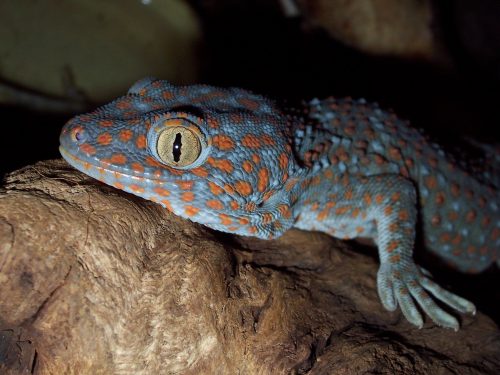Your friend is listening to music through headphones while you study together in the library. They turn to you and ask a question much too loudly.
“Shh!” You whisper. “No need to yell!” Your friend takes out the headphones.
“Sorry, it was loud in there…”
Humans aren’t the only ones who speak up when there’s noise. Animals’ habitats are filled with creaking branches, pounding rain, and the growls and squeaks of other creatures, not to mention sounds from cities and airplanes. Like humans, some other animals increase the loudness of their calls in noisier environments, a phenomenon called the Lombard effect.
“It seems like a very obvious and easy adjustment, probably because we humans do it almost as a reflex,” said Dr. Sue Anne Zollinger, a researcher at the Max Planck Institute for Ornithology in Germany and an author of a recent paper on vocal modifications in geckos. “However, it isn’t clear when and how this effect evolved.”
Scientists have found the Lombard effect in every mammal sampled. Killer whales, for example, call more loudly in the presence of noise from boats. Previously, Zollinger’s team had focused on testing for the Lombard effect in different groups of birds. They found it to be shared across even the most basal bird lineages, suggesting that birds, like mammals, generally speak up in noisy environments.
What about other vertebrates? “The next big question for us was whether the Lombard effect is a trait shared by all vertebrates,” Zollinger said. She and her co-author, Henrik Brumm, wished to investigate reptiles next, but very few reptiles use vocal communication. Geckos are one exception. ,” said Gregory Watkins-Colwell, the collections manager for herpetology and ichthyology at the Yale Peabody Museum of Natural History. For one thing, he pointed out, geckos are nocturnal. While other reptiles use visual and behavioral cues, geckos must rely on acoustics to communicate.
Zollinger and Brumm began their study with Brumm’s pet Tokay gecko, Ringo. Tokay geckos, native to Asia, are known for their distinctive vocalizations. They make two main types of calls: a low chattering and a much louder, nasal “GECK-O.” Brumm and Zollinger recorded Ringo’s calls both in a quiet room and with background noise playing. They analyzed the amplitude, duration, and type of calls the gecko produced in each situation. Then, they sampled other geckos to confirm their findings.
What they found was surprising. The geckos did not call more loudly in noisy environments, so they do not exhibit the Lombard effect. But the geckos did make other adjustments to their vocalizations. In the presence of noise, they used more of the loud “GECK-O” syllables and fewer chatter vocalizations. They also increased the duration of each call note, roughly the equivalent of humans speaking at a normal volume but drawing out each word to be understood.
This study suggests that the Lombard effect is not shared by all vertebrates. It may have independently arisen in mammals and birds. However, Zollinger and Brumm’s work does support the idea that vertebrates are able to adjust the sounds they make to overcome the noise they hear around them.
The research team hopes to expand their investigation to gecko behavior in the field. “Geckos of several species are widespread in urban areas across Asia, and many of these areas are particularly loud as far as anthropogenic noise goes,” Zollinger said. Whether the geckos like it or not, the party is coming to them.

